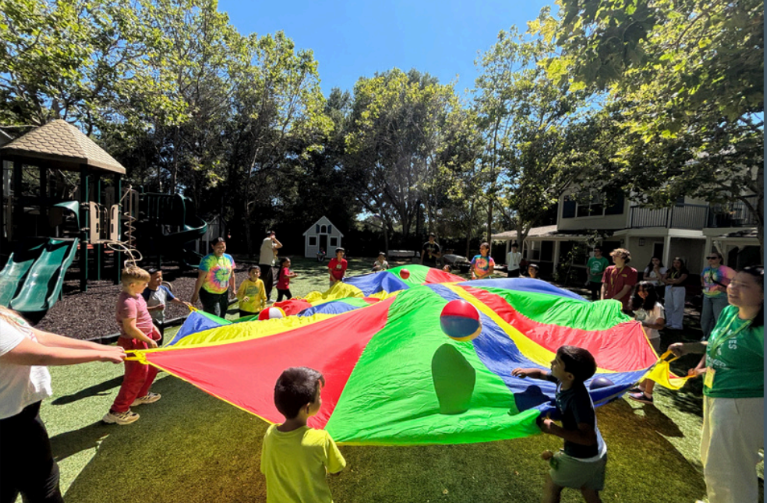
Children play a cooperative game at a LifeMoves summer camp in Silicon Valley.
Photo Courtesy Life Moves
While most children focus on lessons and play during school hours, tens of thousands in California carry the hidden weight of housing insecurity with them every day.
I work at LifeMoves, which provides interim supportive housing in Silicon Valley, serving thousands of clients annually, and where children occupy one-fifth of our beds. We’ve supported elementary-age kids who fall asleep in class, teens burdened with adult responsibilities, and children of all ages disoriented by sudden changes to their lives.
With the school year underway, it’s worth remembering that the approximately 4% of California students experiencing homelessness face a lack of safety and consistency, which deeply affects how they show up, learn and engage.
We meet families during some of the hardest chapters of their lives and connect them to housing and human-centered services. Our goal remains to make the experience rare, brief and nonrecurring.
This has grown more urgent with our state seeing a 39% increase in family homelessness between 2023 and 2024. We’re encouraged that more than 80% of the families we serve move into permanent housing.
Yet even when families exit successfully, the emotional toll on children is undeniable. Kids carry burdens in ways that aren’t always visible, and too often, they move through schools and social spaces where few understand what they’re facing.
The adults they encounter in their lives, like teachers and the parents of other students, can help ease these burdens — or make them even heavier. So, here’s what I ask of you:
To teachers: Thank you for the care and energy you bring to the classroom, often with limited resources. Each morning you enter the classroom, I hope you’ll remember: Children experiencing homelessness may not “look” unhoused. They might still smile, or they might show up tired, distracted or withdrawn. That doesn’t mean they don’t care. It means they’re trying to survive.
Predictability and calm go a long way. Start each day with a consistent routine. Offer gentle check-ins. Build trust. Create low-stakes ways to participate. A child worried about their next meal may not have the energy for a quiz, but they might light up when asked to help pass out papers.
Above all, protect their dignity. If a student needs clean clothes, supplies or snacks, and you’re able to help, offer quietly, respectfully and without fanfare. Let them and their family decide what to share about their lives, if anything, with others.
To parents talking to your child about classmates in crisis: Children notice more than we realize. They may notice a friend wearing the same outfit daily or never hosting playdates. Don’t brush off their curiosity; use it to teach empathy.
Lead with compassion and thoughtful language. Ask questions about your child’s observations. Encourage kindness and inclusion, while avoiding assumptions that could have unintended consequences.
If your child wants to help, suggest small gestures — a kind note, recess check-ins — to help build empathy and let every child know they matter. If your family wants to support more broadly, contact local homelessness service providers or nonprofits to explore opportunities.
In my work, I’ve also learned a lot from the children themselves.
They notice everything. When adults lower their voices or avert their eyes. When they’re pitied or ignored. But they also feel it deeply when they’re welcomed without condition. When someone remembers their name or sees them as more than their circumstances.
Imagine classrooms and communities where kids don’t have to pretend. Where they’re safe, known, and free to be themselves.
Children without housing need the same as any child: love, routine, safety, belonging, and adults who believe in them.
While children currently make up 20% of the people we serve, they represent 100% of our future.
If we want every child to thrive, we must build a world where stability and belonging aren’t determined by housing status.
•••
Anat Leonard-Wookey is vice president of programs and services at LifeMoves, Silicon Valley’s largest provider of interim housing.
The opinions expressed in this commentary represent those of the author. EdSource welcomes commentaries representing diverse points of view. If you would like to submit a commentary, please review our guidelines and contact us.
